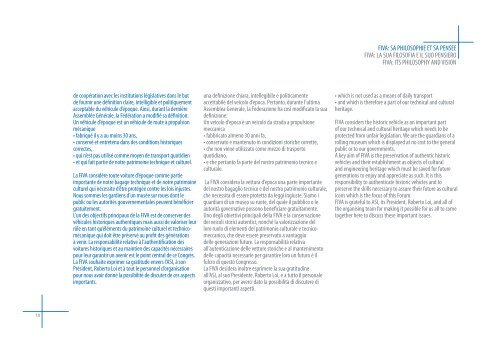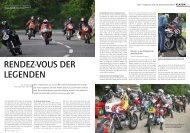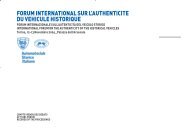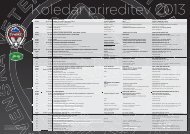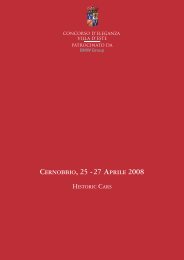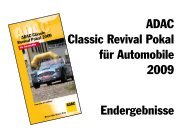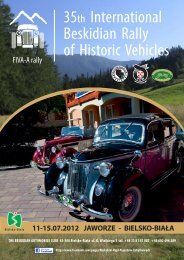Automotoclub Storico Italiano - Fédération Internationale des ...
Automotoclub Storico Italiano - Fédération Internationale des ...
Automotoclub Storico Italiano - Fédération Internationale des ...
You also want an ePaper? Increase the reach of your titles
YUMPU automatically turns print PDFs into web optimized ePapers that Google loves.
10<br />
de coopération avec les institutions législatives dans le but<br />
de fournir une défi nition claire, intelligible et politiquement<br />
acceptable du véhicule d’époque. Ainsi, durant la dernière<br />
Assemblée Générale, la <strong>Fédération</strong> a modifi é sa défi nition:<br />
Un véhicule d’époque est un véhicule de route à propulsion<br />
mécanique<br />
• fabriqué il y a au moins 30 ans,<br />
• conservé et entretenu dans <strong>des</strong> conditions historiques<br />
correctes,<br />
• qui n’est pas utilisé comme moyen de transport quotidien<br />
• et qui fait partie de notre patrimoine technique et culturel.<br />
La FIVA considère toute voiture d’époque comme partie<br />
importante de notre bagage technique et de notre patrimoine<br />
culturel qui nécessite d’être protégée contre les lois injustes.<br />
Nous sommes les gardiens d’un musée sur roues dont le<br />
public ou les autorités gouvernementales peuvent bénéfi cier<br />
gratuitement.<br />
L’un <strong>des</strong> objectifs principaux de la FIVA est de conserver <strong>des</strong><br />
véhicules historiques authentiques mais aussi de valoriser leur<br />
rôle en tant qu’éléments du patrimoine culturel et technicomécanique<br />
qui doit être préservé au profi t <strong>des</strong> générations<br />
à venir. La responsabilité relative à l’authentifi cation <strong>des</strong><br />
voitures historiques et au maintien <strong>des</strong> capacités nécessaires<br />
pour leur garantir un avenir est le point central de ce Congrès.<br />
La FIVA souhaite exprimer sa gratitude envers l’ASI, à son<br />
Président, Roberto Loi et à tout le personnel d’organisation<br />
pour nous avoir donné la possibilité de discuter de ces aspects<br />
importants.<br />
una defi nizione chiara, intellegibile e politicamente<br />
accettabile del veicolo d’epoca. Pertanto, durante l’ultima<br />
Assemblea Generale, la Federazione ha così modifi cato la sua<br />
defi nizione:<br />
Un veicolo d’epoca è un veicolo da strada a propulsione<br />
meccanica<br />
• fabbricato almeno 30 anni fa,<br />
• conservato e mantenuto in condizioni storiche corrette,<br />
• che non viene utilizzato come mezzo di trasporto<br />
quotidiano,<br />
• e che pertanto fa parte del nostro patrimonio tecnico e<br />
culturale.<br />
La FIVA considera la vettura d’epoca una parte importante<br />
del nostro bagaglio tecnico e del nostro patrimonio culturale,<br />
che necessita di essere protetta da leggi ingiuste. Siamo i<br />
guardiani di un museo su ruote, del quale il pubblico o le<br />
autorità governative possono benefi ciare gratuitamente.<br />
Uno degli obiettivi principali della FIVA è la conservazione<br />
dei veicoli storici autentici, nonché la valorizzazione del<br />
loro ruolo di elementi del patrimonio culturale e tecnicomeccanico,<br />
che deve essere preservato a vantaggio<br />
delle generazioni future. La responsabilità relativa<br />
all’autenticazione delle vetture storiche e al mantenimento<br />
delle capacità necessarie per garantire loro un futuro è il<br />
fulcro di questo Congresso.<br />
La FIVA <strong>des</strong>idera inoltre esprimere la sua gratitudine<br />
all’ASI, al suo Presidente, Roberto Loi, e a tutto il personale<br />
organizzativo, per averci dato la possibilità di discutere di<br />
questi importanti aspetti.<br />
FIVA: SA PHILOSOPHIE ET SA PENSEE<br />
FIVA: LA SUA FILOSOFIA E IL SUO PENSIERO<br />
FIVA: ITS PHILOSOPHY AND VISION<br />
• which is not used as a means of daily transport<br />
• and which is therefore a part of our technical and cultural<br />
heritage.<br />
FIVA considers the historic vehicle as an important part<br />
of our technical and cultural heritage which needs to be<br />
protected from unfair legislation. We are the guardians of a<br />
rolling museum which is displayed at no cost to the general<br />
public or to our governments.<br />
A key aim of FIVA is the preservation of authentic historic<br />
vehicles and their establishment as objects of cultural<br />
and engineering heritage which must be saved for future<br />
generations to enjoy and appreciate as such. It is this<br />
responsibility to authenticate historic vehicles and to<br />
preserve the skills necessary to assure their future as cultural<br />
icons which is the focus of this Forum.<br />
FIVA is grateful to ASI, its President, Roberto Loi, and all of<br />
the organising team for making it possible for us all to come<br />
together here to discuss these important issues.


